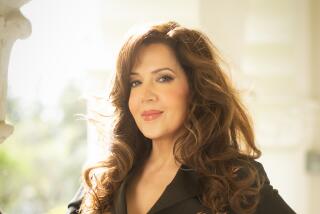Navigating the Way for Latino Parents of the Disabled
- Share via
Agustin and Rita Gonzalez were told that their daughter Veronica would not even begin to walk until she was a teenager. When their older daughter Angelica was 2, Larry and Dotti Lopez noticed that her speech had stopped developing. Their younger daughter, Isela, stopped making sounds at 13 months.
Veronica Gonzalez was mentally retarded; the Lopez girls were autistic. Both sets of parents were thrown into a world of special school officials, state and federal bureaucracies--the world of caring for children with disabilities.
For the Gonzalezes and the Lopezes--and countless other families over the last two decades--navigating that world has been made easier by Fiesta Educativa, a small nonprofit organization based in Lincoln Heights that helps parents understand the laws that govern care for the disabled.
Throughout the year, the group works with a small core of families, primarily Latinos in the Los Angeles area, at bimonthly meetings called fiestas familiares. Parents and children gather at homes or churches to share tips, hear presentations by professionals, or simply draw strength from one another’s struggles. Recent topics have included communication methods and sexuality in the disabled community.
The organization’s most visible activity is its annual Fiesta Educativa conference at USC. Last year’s drew 1,200 families from California and other states. This year’s conference will be June 4 and 5.
The families come to hear bilingual presentations by professionals on topics ranging from the latest medical equipment to techniques for controlling behavior. Some of the most common disabilities Fiesta Educativa deals with are Down syndrome, cerebral palsy, mental retardation and autism.
Parents also can learn about families’ rights to public services, says Irene Martinez, who co-founded Fiesta in 1978, focusing on East L.A. families who spoke limited English. Martinez says Latino parents generally take a passive approach toward requesting services, often isolating themselves and their disabled children from society, considering as favors the services that actually are legal rights.
“It’s extremely difficult for them to understand that if authorities say no to them, it doesn’t [necessarily] mean no,” Martinez says. “Studies have shown that [Latino parents] disproportionately are not filing appeals.” But there is a detailed appeal process that can begin at neighborhood schools or regional centers, and Martinez says that parents frequently win.
The first Fiesta Educativa was a small workshop organized by Martinez and other social workers with the Eastern Los Angeles Regional Center for the Developmentally Disabled. The group noticed that California had a great system of services for the disabled through contracted regional centers, but the patients who benefited were those whose parents knew the laws.
Word of Fiesta Educativa spread quickly throughout California, and in 1980 it moved to USC, which helped sponsor the conference along with the Los Angeles Unified School District and the California Department of Rehabilitation. In the early 1980s, parents from other states started attending and eventually started smaller versions of Fiesta Educativa in Texas, Colorado and New Mexico. California’s Fiesta now has regional chapters in San Diego, the Imperial Valley and Hayward.
Fiesta teaches about the laws that govern the education and daily lives of the disabled: California’s Lanterman Act, and the federal Individuals with Disabilities Education Act and Americans with Disabilities Act. It explains how to manage the Individual Educational Program, a legal document filed with schools.
But Fiesta’s broader mission is to promote leadership, urging parents to join committees and participate in civic affairs so they can have a more direct impact on issues facing the disabled.
*
The mail-in preregistration deadline for Fiesta Educativa is May 30, but walk-ups are encouraged. Registration fees per day are $45 per adult, $65 per couple and $50 per professional. Some scholarships are available through school districts, regional centers, family resource centers and Head Start. Information: (323) 221-6696.
* Times staff writer Jose Cardenas can be reached via e-mail at Jose.Cardenas@latimes.com.
More to Read
Sign up for Essential California
The most important California stories and recommendations in your inbox every morning.
You may occasionally receive promotional content from the Los Angeles Times.













